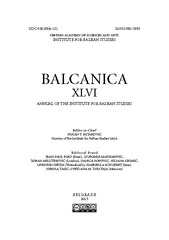| dc.creator | Živković, Valentina | |
| dc.date.accessioned | 2019-05-16T09:37:38Z | |
| dc.date.available | 2019-05-16T09:37:38Z | |
| dc.date.issued | 2015 | |
| dc.identifier.issn | 0350-7653 | |
| dc.identifier.uri | http://www.doiserbia.nb.rs/Article.aspx?id=0350-76531546061Z | |
| dc.identifier.uri | https://dais.sanu.ac.rs/123456789/6029 | |
| dc.description.abstract | The focus of the paper is on bequests pro male ablatis in the wills of Kotor citizens drawn up between 1326 and 1337 against the backdrop of their own time and the dynamic relationship between Christian ethics and mercantile and banking practices. The concept of bequests pro male ablatis has been analysed as part of the well-developed practice, strongly influenced by confessors, of making testamentary gifts pro remedio animae and preparing for a good death. | en |
| dc.language | English | |
| dc.publisher | Belgrade : Institute for Balkan Studies, Serbian Academy of Sciences and Arts | |
| dc.relation | info:eu-repo/grantAgreement/MESTD/Basic Research (BR or ON)/177003/RS// | |
| dc.rights | openAccess | |
| dc.rights.uri | https://creativecommons.org/licenses/by-nc-nd/4.0/ | |
| dc.source | Balcanica | |
| dc.subject | wills | |
| dc.subject | male ablata | |
| dc.subject | Kotor (Cattaro) | |
| dc.subject | legacies ad pias causas | |
| dc.subject | usury | |
| dc.subject | sin | |
| dc.subject | confessors | |
| dc.title | Sentio me grauatum de malo ablato - Compensation for the Sin of Ill-gotten Gain in the Wills of Kotor (Cattaro) Citizens 1326–1337 | en |
| dc.type | article | en |
| dc.rights.license | BY-NC-ND | |
| dcterms.abstract | Живковић, Валентина; | |
| dc.citation.spage | 61 | |
| dc.citation.epage | 78 | |
| dc.citation.issue | XLVI | |
| dc.identifier.wos | 000373142500004 | |
| dc.identifier.doi | 10.2298/BALC1546061Z | |
| dc.type.version | publishedVersion | en |
| dc.identifier.fulltext | https://dais.sanu.ac.rs/bitstream/id/19271/bitstream_19271.pdf | |
| dc.identifier.rcub | https://hdl.handle.net/21.15107/rcub_dais_6029 | |

